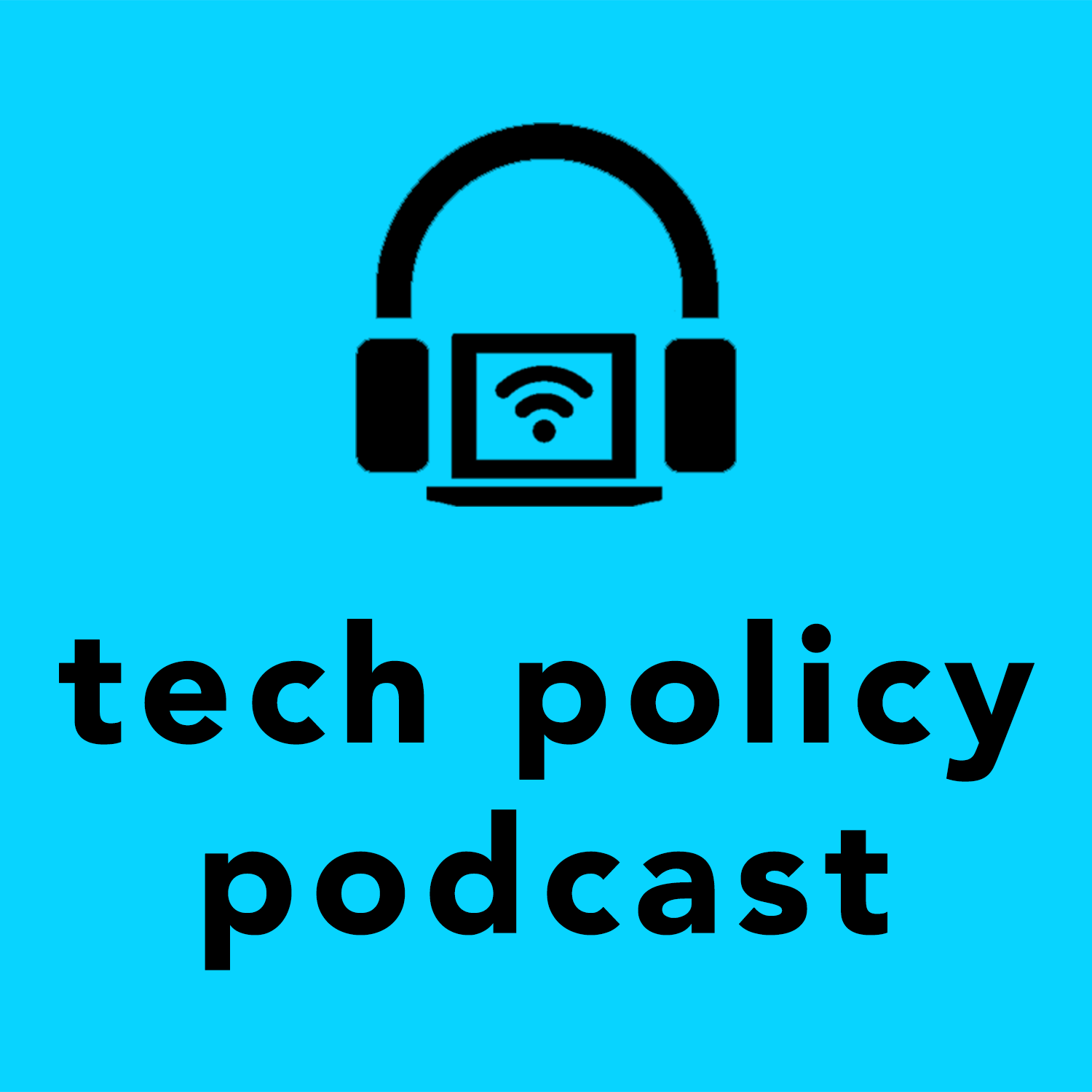Episodes
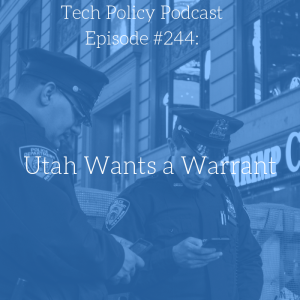
Wednesday Apr 03, 2019
#244: Utah Wants a Warrant
Wednesday Apr 03, 2019
Wednesday Apr 03, 2019
Despite a recent Supreme Court victory in Carpenter v. United States, progress in defending personal data from government snooping has been at a crawl at the federal level. Fortunately, state legislatures have been taking their own actions to protect privacy. Connor Boyack, president of the Libertas Institute, joins the show to discuss his organization’s work on a bipartisan bill that passed unanimously in Utah, and what the new law means both for the state and the broader conversation on data privacy around the country.
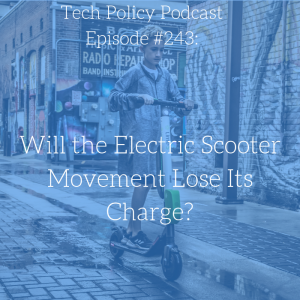
Monday Dec 03, 2018
#243: Will the Electric Scooter Movement Lose Its Charge?
Monday Dec 03, 2018
Monday Dec 03, 2018
Electric scooters been popping up in cities all over the US, seemingly overnight. While many have found the scooters to be a welcome addition to their transportation options, some local governments have tried to regulate them out of existence. Jennifer Huddleston Skees, Research Fellow at the Mercatus Center, joins the show to discuss the benefits and risks of the growing electric scooter trend, and how cities can work with innovators to keep transportation both accessible and safe. For further discussion, follow Jennifer on Twitter, and see her other work, including a recent op-ed on scooter regulation.
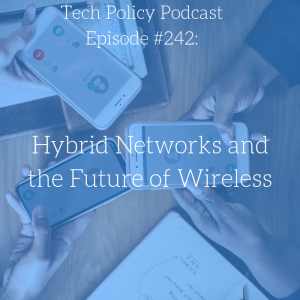
Monday Nov 26, 2018
#242: Hybrid Networks and the Future of Wireless
Monday Nov 26, 2018
Monday Nov 26, 2018
The proposed merger of Sprint and T-Mobile raised a plethora of concerns from both regulators and the general public. In response, the Federal Communications Commission (FCC) welcomed comments on the proposed merger to evaluate the benefits and potential harms of the proposed New T-Mobile. Although the anti-competitive analysis was quite extensive, it was incomplete as the FCC declined to include the role of Hybrid Mobile Network Operators (HMNOs) on the market for mobile wireless services.
Today, Michelle P. Connolly, Professor of the Practice in the Economics Department at Duke University, is here to discuss her recent report on the role of HMNOs and why the FCC should have broadened its definition of the mobile telephony and broadband market to account for HMNOs, as this narrow scope accurately reflects how the market is satisfying consumer demand for mobile broadband services.
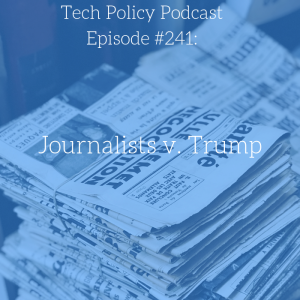
Thursday Nov 08, 2018
#241: Journalists v. Trump
Thursday Nov 08, 2018
Thursday Nov 08, 2018
President Trump is known for his aggressive attitude toward the media, but do his actions and statements represent a violation of the First Amendment? In a recent lawsuit, PEN America argues that Trump’s use of regulatory and enforcement powers against critical media outlets goes well beyond constitutional limits. Joining the show to discuss the case are Kristy Parker, counsel for Protect Democracy, the nonprofit helping to represent PEN America in the case; and Berin Szóka, president of TechFreedom. For more information about the case, see Protect America’s overview.
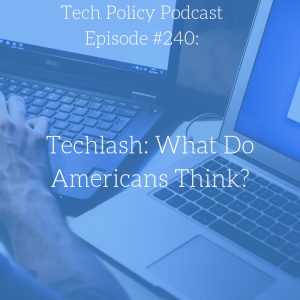
Tuesday Oct 16, 2018
#240: Techlash: What Do Americans Think?
Tuesday Oct 16, 2018
Tuesday Oct 16, 2018
The tech industry’s reputation has taken several hits in recent years over privacy breaches, allegations of bias, and concerns over election interference, causing a backlash in public opinion. But exactly how severe in this “techlash” among American consumers? What do they think government's role should be in regulating the sector? A recent NetChoice poll attempts to answer these questions. The organization’s president and CEO, Steve DelBianco, joins the show to discuss the poll’s results.
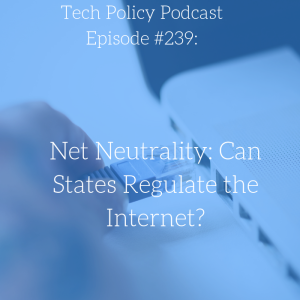
Monday Oct 08, 2018
#239: Net Neutrality: Can States Regulate the Internet?
Monday Oct 08, 2018
Monday Oct 08, 2018
California Governor Jerry Brown signed a bill on September 30 that would apply the net neutrality regulations imposed by the 2015 Open Internet Order to Internet service providers in the state of California. Will the law stand up to the legal challenges against it? And what can states do to protect consumers when it comes to Internet service? Ash is joined by TechFreedom President Berin Szóka and former TechFreedom Legal Fellow Graham Owens to discuss. For more, see Graham’s paper on state regulation of broadband, and our other work on net neutrality, including our letter urging the veto of the bill, and our statement in support of the Department of Justice’s lawsuit against it.
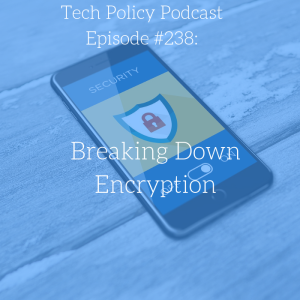
Tuesday Oct 02, 2018
#238: Breaking Down Encryption
Tuesday Oct 02, 2018
Tuesday Oct 02, 2018
Encryption continues to be a contentious policy issue, with law enforcement constantly applying pressure on companies to create backdoors to aid in criminal investigations. Most recently, the US government has urged Facebook to compromise the encryption features in its Messenger app, which has been used by MS-13 gang members. But what would be the consequences of such measures? How exactly does encryption work? Navroop Mitter, CEO of Armortext, joins the show to discuss.
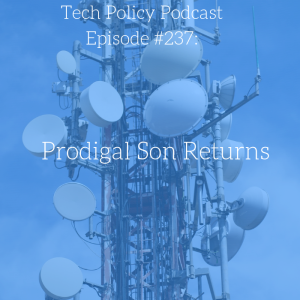
Friday Sep 21, 2018
#237: Prodigal Son Returns
Friday Sep 21, 2018
Friday Sep 21, 2018
Evan Swarztrauber, the Tech Policy Podcast’s original host, returns to discuss the work he’s doing to speed the deployment of 5G wireless networks in his new role as policy advisor to FCC Commissioner Brendan Carr. For more, follow Evan and Twitter, and listen to his new FCC podcast, More than Seven Dirty Words.
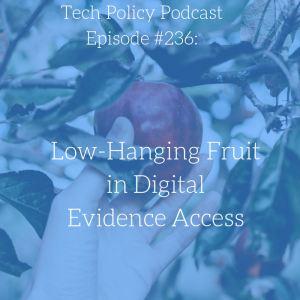
Monday Sep 10, 2018
#236: Low Hanging Fruit with Professor Daskal
Monday Sep 10, 2018
Monday Sep 10, 2018
Law enforcement continues to face challenges with the evolving problems associated with digital evidence gathering. Just last year, US law enforcement made over 130,000 requests for digital evidence to just six tech companies - Google, Facebook, Microsoft, Twitter, and Oath. These requests to internet service providers have not gone smoothly, as law enforcement is often not suited to accommodate such technical requests or simply do not know what they are looking for. Service providers, in turn, are quite reluctant to comply with these demand for “any and all” data, citing fears that trade secrets or sensitive information will be leaked. Today Jennifer C. Daskal, Adjunct Professor at American University Washington College of Law, is here to discuss her recently published CSIS report titled “Low Hanging Fruit” on what challenges law enforcement encounter, how to address these problems, and policy recommendations to Congress, law enforcement agencies, and Service Providers.
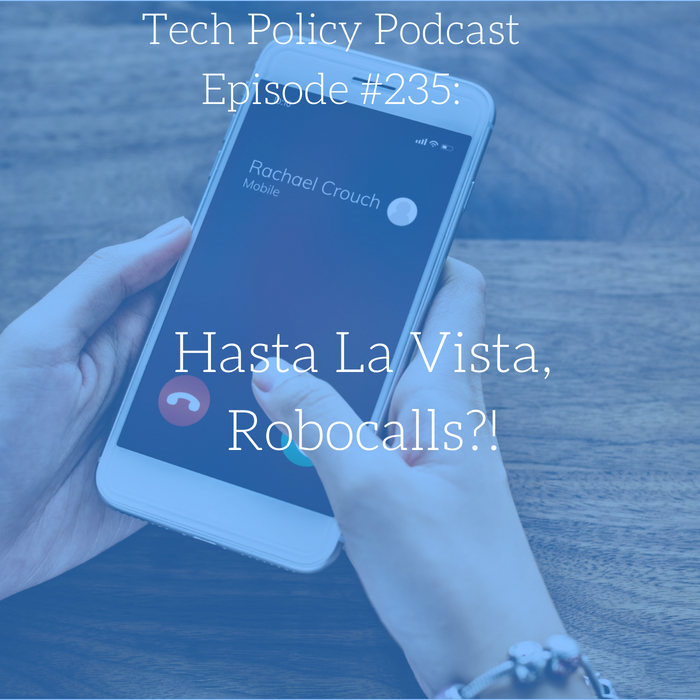
Monday Aug 06, 2018
#235: Hasta La Vista, Robocalls?!
Monday Aug 06, 2018
Monday Aug 06, 2018
The FCC welcomed Comments on how to interpret what an Automatic Telephone Dialing Systems(ATDS) is under the TCPA, which targets telephone solicitations that rely upon equipment that have the capacity to store or produce numbers using a random or sequential number generator, and to dial those numbers without human intervention. This comes after the ACC International v. FCC ruling where the FCC’s interpretation of an ATDS in its’ 2015 Declaratory Ruling and Order was held as overly broad. That interpretation encompassed all technology with both the present and theoretical capacity as an ATDS, which meant smartphones would be viewed as an ATDS. Will the FCC revert back to a broader interpretation or will the narrower approach prevail? Today we welcome Charlie Kennedy, Adjunct Fellow for TechFreedom, and Jim Dunstan, General Counsel for TechFreedom, to discuss which interpretation of an ATDS is best for both consumers and businesses. For more info, see TechFreedom’s statement on the issue, and the comments we filed with the FCC.

